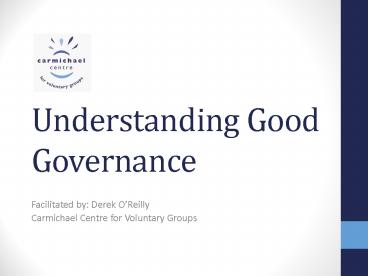Understanding Good Governance - PowerPoint PPT Presentation
1 / 24
Title:
Understanding Good Governance
Description:
Understanding Good Governance Facilitated by: Derek O Reilly Carmichael Centre for Voluntary Groups Leadership requires Teamwork: Lessons we can learn from Geese ... – PowerPoint PPT presentation
Number of Views:617
Avg rating:3.0/5.0
Title: Understanding Good Governance
1
Understanding Good Governance
- Facilitated by Derek OReilly
- Carmichael Centre for Voluntary Groups
2
Leadership requires TeamworkLessons we can
learn from Geese
- http//www.youtube.com/watch?vAOBthOPuw2U
3
The Board/Committee Team
- Board members as equals
- Communication within the Board
- Interaction in meetings
- Board roles
- Communication with external stakeholders
- Problem solving, conflict resolution and decision
making
4
Board/Committee Rotation Rejuvenate
- Boards go through life-cycles or phases
- Different ways of working are needed at different
stages - Board rotation is necessary for appropriate
representation and rejuvenation
5
Avoid Groupthink
- Groupthink
- Self censorship to agree with majority view
- Silence taken as agreement
- Unquestioned belief in the groups right to be
- Collective efforts to rationalise as a means of
avoiding past policy decisions - Collective excessive optimism which encourages
the taking of extreme risks
6
Keep the Board/Committee Energised
- Say Thank You
- Respect and recognise Board members and volunteers
7
- Setting Boundaries Roles of the Chairperson and
CEO/Manager
8
Chair/CEO Relationship
- Mutual respect and understanding
- A line management relationship
- Regular communication
- Mutual expectations
- Annual appraisal
- External support
9
Board/CEO Relationship
- Mutual respect and understanding
- Timely, accessible and appropriate information
- Constructive support and challenge
- Board development
10
Reporting to the Board
- Tracking activity
- Progress against objectives
- Financial reporting
- Legal compliance
- Staff/Volunteers
- Effectiveness of services/activities
- Value for money
11
The Governance Code
- A Proposed Code of Practice for Good Governance
of CV Organisations - http//www.governancecode.ie/
12
The Principles
- Providing leadership
- Exercising control
- Being transparent and accountable
- Working effectively
- Behaving with integrity
13
1st Principle Providing leadership for your
organisation
- Purpose, vision and values.
- Planning.
- Managing, supporting and holding to account
volunteers and all who act on behalf of the
organisation.
14
2nd Principle Exercising Control
- Legal requirements
- Financial controls
- Risk management
15
Risk management
- Think about problems that may arise, e.g.
- Garda vetting
- Your database/mailing list
- Paying back a bank loan
16
3rd Principal Being transparent and accountable
- Communicating with stakeholders
- Responding to stakeholders
- Involving your beneficiaries
17
4th Principal Working effectively
- Understanding roles
- Effective meetings
- Board development
18
5th Principal Integrity
- Honesty, fairness and independence
- Conflicts of interest and loyalties
- The organisations reputation
19
The Concept of Proportionality
- No one size fits all
- Factors such as size, level of funding, skills
and experience - The five principles remain the same
- Recommended actions differ depending on the
Organisation Type
20
Organisation Types
- Type A board involved in governance, management
and operations - Type B board involved in governance and some
management and operations - Type C board involved in governance only
21
Evolving Roles
- Shifting sands how boundaries can move over time
- Recognising the difference between Governance,
Management and Operations - The challenge of wearing several hats
22
Conclusions
- The increasing emphasis on
- quality and (self)regulation
- The Charities Act 2009
- Guiding Principles for Fundraising
- SORP (Statement of Recommended Practice)
- PQASSO
23
Useful weblinks
- http//www.carmichaelcentre.ie/sites/default/files
/Charites20Act20Summary_update2010.pdf - http//www.ictr.ie/files/Compliance20Checklist.pd
f - http//www.dochas.ie/Shared/Files/4/A_Note_on_Char
ities_SORP.pdf - http//www.ces-vol.org.uk/index.cfm?pg42
24
Board Health Check
- Determine the effectiveness of the board
- Ten questions for you to consider































